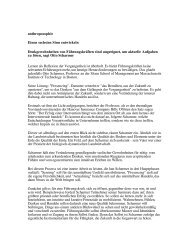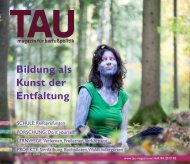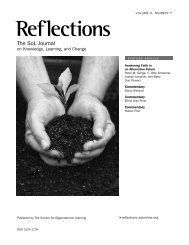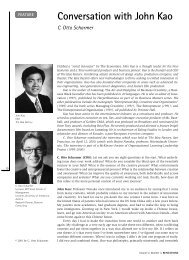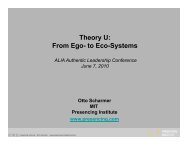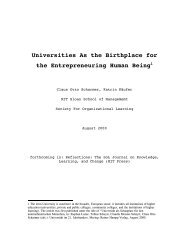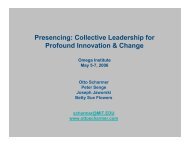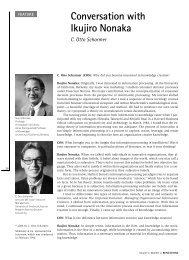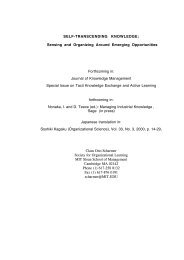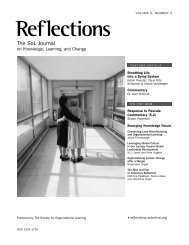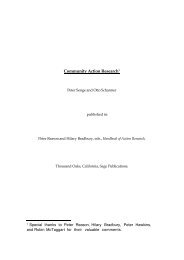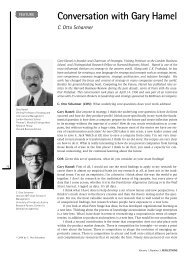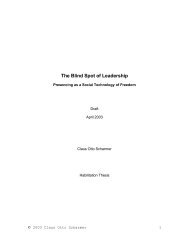Conversation with Charles Handy - Otto Scharmer
Conversation with Charles Handy - Otto Scharmer
Conversation with Charles Handy - Otto Scharmer
Create successful ePaper yourself
Turn your PDF publications into a flip-book with our unique Google optimized e-Paper software.
Certainly the reason that you mend the sock is that you want the sock to survive. And thereason you change the organization is that you want the organization to live on.Elizabeth <strong>Handy</strong>: And it is really for the people that the organization continues?<strong>Charles</strong> <strong>Handy</strong>: Well, that is a very good question. I mean, in the American ideology ofcapitalism, it is not for the people in the organization; it is for their financiers. That willnot be enough to sustain the organization, because the easy way to satisfy the financiersis to sell the organization. So, it is rather like my sock: You mend the sock to keep thesock going. Even at the end, when you changed it so often that it is not the same sock,still in a way, it is the same sock. But, you wouldn’t bother to mend the sock unless youwanted to go on using that sock—you would just throw it away. So, the whole motivationfor change, it seems to me, and therefore for learning, development, and growth, isthat we want to continue as long as possible.<strong>Conversation</strong> <strong>with</strong> <strong>Charles</strong> <strong>Handy</strong> SCHARMERCOS: With regard to the big question you mentioned—why do organizations exist? whatare they for? who are they for?—what are your key findings?<strong>Charles</strong> <strong>Handy</strong>: Well, findings is not the kind of word that you can really use to describewhat I do. Suggestions is as far as I would actually go.COS: Okay.<strong>Charles</strong> <strong>Handy</strong>: The suggestion that business organizations are essentially the property ofthe shareholders and that the shareholders are the people who have paid the money forthem is the kind of understanding that underpins Anglo-American capitalism. I do not thinkthat that is a sustainable concept of the organization, and I have suggested that it is nowadaysmuch more sensible to regard organizations as living communities of people, becausethe principal assets of a modern business organization are literally its people. This was notso a long time ago. The principle assets were bricks and mortar or machines or boat or materialsof some sort, and you hired people to make them work for you. But now, the physicalassets are perhaps one-tenth of the value of the company.So, if organizations are communities, then it is wrong toregard communities of living people as being owned by anybody.Let’s talk the right sort of language: People don’t ownother people in a modern democratic society. If this suggestionis taken seriously, it again raises big questions about therelationship between the stockholders and the employees.COS: And other stakeholders.People don’t own other people ina modern democr atic society . Ifthis suggestion is taken seriously ,it again r aises big questions aboutthe relationship between thestockholder s and the employees.<strong>Charles</strong> <strong>Handy</strong>: And other stakeholders, but those are theprincipal ones that are affected. The employees have to begiven more rights, and the stockholders have to have less power, because the stockholdersare not particularly interested in this community living forever. They are only interested,really, in making money out of it or at least getting their money back. Some of theresearch says that the stockholders do actually take a longer term view than people think,but I still don’t think they are particularly concerned <strong>with</strong> the existence of the organizationbeyond 5 or 10 years, maybe. Even the employees of a community don’t really lookmuch beyond the grave. They really, really want the company to exist as long as their lifetimein that community. I think that it has to be a much longer term view than that, actually,to give the company the drive that I think you need for learning, adaptation, andlong-term investment.69COS: So, what would such a constitutional foundation actually look like?<strong>Charles</strong> <strong>Handy</strong>: It would be a constitution based on a set of rights. I am arguing that thefinanciers have certain rights. They would be rights equivalent to people who hold aREFLECTIONS, Volume 1, Number 2



